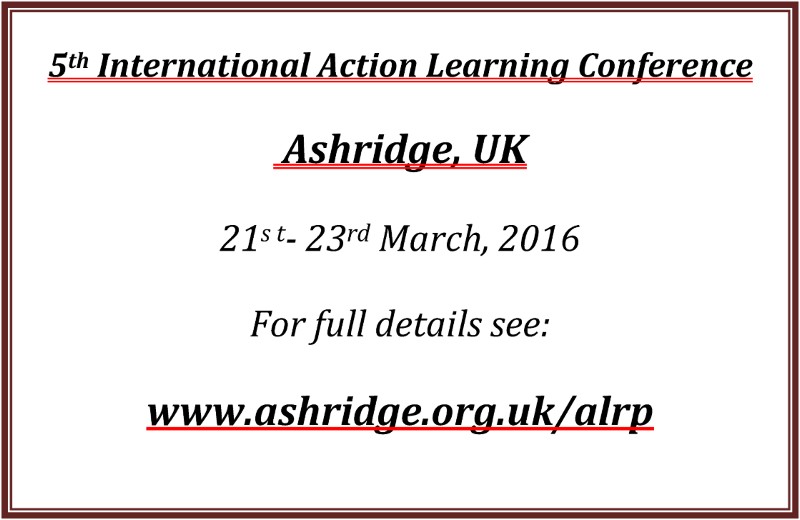When does action learning (AL) become research and when might action learners get confronted with some of the ethical and methodological challenges that confront those who are researching and writing about organisational issues from other traditions? To provoke discussion we have included in this edition an interesting reflective piece by James Traeger writing from his experience of doing action research (AR).
The similarities and differences between AL and AR are much discussed (Raelin Citation2009; Coghlan Citation2010). Each have differing origins and forebears (Revans for AL; Lewin for AR). Yet ironically and confusingly for those coming new to the field, the literatures are fairly siloed, with Raelin and Coghlan being relatively rare in straddling and contributing to both. Some see the distinctions between AR and AL as so scant as to be splitting hairs. Some have asked what is the difference between Revan's philosophy of learning as captured in his System alpha, beta and gamma (where System alpha is investigation of the organisational issue in its context; System beta is inquiry into resolution, through cycles of trial and error, action and reflection; and System gamma is the learning, framing and self-awareness of the participants) and the First, Second and Third person Enquiry of AR (Reason and Torbert Citation2007) (first person – enquiring into my own practice; second – investigating with others; third – engaging with or contribution to a wider audience such as policy and debates in the world at large). Typically the key difference highlighted between AR and AL is to say that while both are grounded in tackling real organisational or societal issues, AL is principally committed beyond this to learning for those directly involved and is not particularly interested in whether such learning goes beyond the specific group or organisation, whereas, AR is concerned that wider knowledge be distilled from the specific issue, to be shared with a wider (third person) audience.
Yet even while we debate the similarities and distinctions there are times when the worlds of AL and AR overlap. In other words, when does AL make a ‘research turn’? In this journal, as action learners write up their experiences or systematically evaluate and theorise from their practice, is not that now a sharing to a third person audience and a concern to generate wider, useable knowledge for others? Arguably the research turn of AL is captured by the hybrid term ‘AL research’ (Coghlan and Coughlan Citation2010) introduced to describe activity that has a threefold commitment to learning, to action and to the generation of ‘actionable knowledge’ (Argyris Citation2003), what Coghlan and Coughlan refer to as the ‘action turn’ of research. The notion of AL research has been debated previously in this journal and no doubt will be revisited at the 2016 biannual Action Learning: Research and Practice conference (see details below). But for now what I want to highlight is the significance of James Traeger's ideas on the ethical and methodological dilemmas of action researchers for the field of AL. He highlights a paradox whereby requirements for demonstrating compliance to academic research conventions can inadvertently be at odds with enabling the voices of organisation members to be heard. This seems valuable food for thought for those action learners who are taking a research turn and converting their work into actionable knowledge for a wider audience.

References
- Argyris, C. 2003. “Actionable Knowledge”. In The Oxford Handbook of Organization Theory, edited by T. Tsoukas and C. Knudsen, 423–452. Oxford: Oxford University Press.
- Coghlan, D. 2010. “Seeking Common Ground in the Diversity and Diffusion of Action Research and Collaborative Management Research Modalities: Toward a General Empirical Method.” In Research in Organizational Change and Development, edited by W. A. Pasmore, A. B. (Rami) Shani, and R. W. Woodman, Vol. 18, 149–181. Bingley: Emerald.
- Coghlan, D., and P. Coughlan. 2010. “Notes Towards a Philosophy of Action Learning Research.” Action Learning: Research and Practice 7 (2): 193–203. doi: 10.1080/14767333.2010.488330
- Raelin, J. 2009. “Seeking Conceptual Clarity in the Action Modalities.” Action Learning: Research and Practice 6 (1): 17–24. doi: 10.1080/14767330902731269
- Reason, P., and W. R. Torbert. 2007. “Toward a Transformational Science: A Further Look at the Scientific Merits of Action Research.” In The SAGE Handbook of Action Research: Participative Inquiry and Practice, edited by Peter Reason and Hilary Bradbury.
